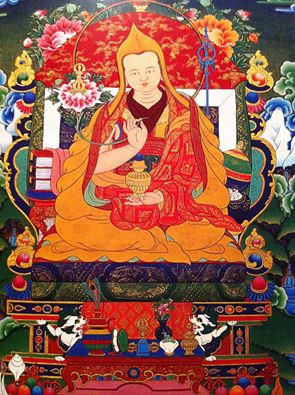I realized that I forgot to post a link to the interview I did with Gordon White for his Rune Soup podcast a few months ago here on the blog. Gordon and I had some trouble finding a strong enough internet connection when I was in South Africa to do the interview and I eventually ended up having to sneak into an empty lecture theatre late at night at the University of Cape Town with the help of an old friend and plug my laptop into a stray Ethernet cable to get good enough wifi to proceed (my thanks to said friend for the help and for getting a bemused pizza guy to show up at one point halfway through the interview).
Tag Archives: online esotericism
Tantric Sex Partners, Actual and ‘Imagined’: Tibetan Karmamudra, and the Life and Times of Lelung Jedrung Zhepai Dorje

(The Great Fifth Lelung Jedrung Rinpoche, Zhepai Dorje)
Recently, Tibetan scholar, traditional physician and yogi Dr Nyida Chenaktsang told me about (and gave me permission to read) a short text by the 18th century Tibetan yogi and visionary saint or ‘treasure revealer’, Lelung Jedrung Zhepai Dorje (sle lung rje drung bzhad pa’i rdo rje, 1697-1740). This saint, whose name means something like ‘the Jedrung reincanation, the laughing/proclaiming tantric thunderbolt, or non-dual reality from the Lelung region’, is also known by the personal names Trinlay Wangpo and Lobsang Trinlay. He was born in Ölga/Ölkha, a region in Lhoka in South-Western Tibet, and was recognized as the Fifth Jedrung Rinpoche – that is to say, as the reincarnation of Drubchen Namkha Gyaltsen (1326-1401), the celebrated master who was one of Je Tsongkhapa (1357-1419), the founder of the Gelukpa lineage’s, principal gurus. Yet, despite being the re-embodiment of a celibate master – of one who played mentor to boot to a figure strongly associated with the monastic regulation and circumscription of tantra in Tibet, AND despite the fact that Lelung Zhepai Dorje had himself received monk’s ordination from the Sixth Dalai Lama at the age of seven, the text that Dr Nyida brought to my attention has nothing to do with either vows of celibacy or monasticism. Continue reading
The Social Life of Magic: Memories of Hoodoo in Detroit
In occult ‘scenes’ you find a lot of people identifying as magicians. Of course, this makes sense: if you do magical rituals, especially if you do them professionally for clients, then why not call yourself the rusty, graveyard dirt-smeared spade that you are?
Still, discussions about self-identifying as a contemporary practitioner of magic and the supposed implications of this, can potentially distract from the fact that magic isn’t just something people say they do or are, it’s something that merely exists as part of the everyday rhythms of many people’s lives, and that’s ok. In a beautiful piece, Kenya Coviak reminisces about growing up in Detroit and reflects on the ways that Hoodoo was literally a part of the scenery, furniture, and foundations of her daily life.

